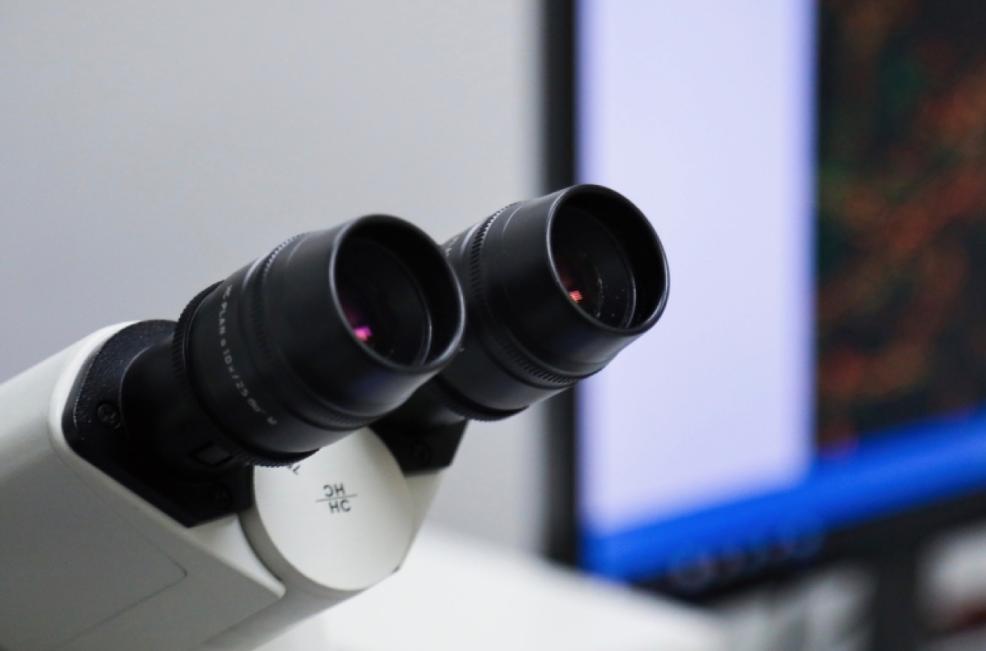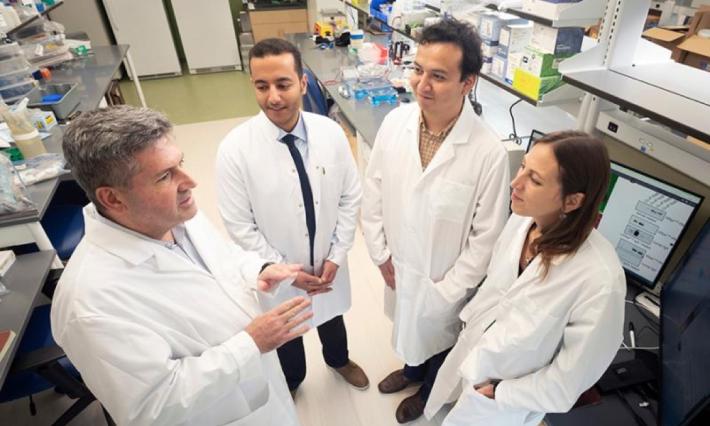Timeline
2012
- The Duke Cancer Institute (DCI) and the Duke University School of Medicine commit to a five-year, $3 million investment in a new Duke BioRepository & Precision Pathology Center (BRPC) — a clinical research and discovery entity with its administrative home in the Department of Pathology. Michael Datto, MD, PhD, is named director.
2013
- Shannon McCall, MD, takes over as director of the BRPC and the BRPC receives CAP accreditation as a tissue, blood, and fluid biorepository, tissue procurement service, and research support core laboratory.
2014
- The BRPC becomes an approved Duke University School of Medicine Service Center (also known as a Core Research Facility) and a DCI Shared Resource.
- Duke Cancer Institute begins partnering with leading private diagnostics companies and the Duke University Health System Clinical Labs to screen the DNA of cancer cells in tumor tissue and blood for hundreds of potentially "druggable" (targetable with anti-cancer drugs) molecular alterations.
2016
- Jiaoti Huang, MD, PhD, is named chair of the Department of Pathology.
- The BRPC absorbs the Pathology Department’s Research Histology Laboratory (then led by Alan Proia, MD, PhD) and adds Histology and Immunohistochemistry services; laser capture microdissection tech; and a tissue microarrayer device.
2017
- North Carolina Biotechnology Center infrastructure grant is awarded to Shannon McCall, MD, BRPC director, which allows for the addition of a Leica AT2 whole slide imager, dedicated image handling software, and the Visiopharm Oncotopix research image analysis software platform.
2017-2018
- The BRPC leadership team expands with the addition of an associate director — Xiaoyin (Sara) Jiang, MD. (Jiang serves in that role throughout 2018 and early 2019 before becoming chief of the Head and Neck Pathology Service)
- In-house Molecular Registry of Tumors called Frameshift MRT — the backbone of the Precision Cancer Medicine Initiative — is developed, designed, and programmed by Michael Datto, MD, PhD, with the assistance of Chris Hubbard and input from Shannon McCall, MD, at minimal cost (covered by Pathology). No outside software contracts or private programming services are required.
2018
- The first multidisciplinary Molecular Tumor Board (MTB) meeting — co-led by DCI oncologists John Strickler, MD (a medical oncologist with solid tumor expertise) and Matthew McKinney, MD (a medical oncologist who specializes in hematologic malignancies) — is held on Jan. 29. The MTB meets weekly to discuss comprehensive genomic profiling results and promote the adoption of precision oncology at DCI.
- Executive Director of DCI Michael Kastan, MD, and Chair of the Department of Pathology, Jiaoti Huang, MD, PhD, sign a memorandum of understanding to fund the positions necessary to support the growing Duke Precision Cancer Medicine Initiative.
- The Duke Cancer Institute is invited to join a national consortium of institutions pooling their de-identified genomic data into a national molecular registry of tumors for the global good of cancer research and care [PROJECT GENIE (Genomics, Evidence, Neoplasia, Information, Exchange).
- Shannon McCall, MD, Duke site PI, and her team of BRPC experts in histopathologic and molecular data annotation, partner with Michael Datto, MD, PhD, Chris Hubbard, computer programmers Jeremy Gresham and Michael Fox, and Kouros Owzar, PhD (director of the DCI Bioinformatics Shared Resource), prepare the first annual batch of 500 (de-identified) NGS test records from Frameshift MRT for upload into the GENIE system.
- A bioinformatician/data analyst (Jonathan Bell, PhD) — split-funded by DCI and the Pathology Department — is hired to support the Duke Precision Cancer Medicine Initiative.
2019
- The Duke University AI Health Initiative invests in a Leica GT450 whole slide imager and image server for the BRPC.
- Genetics scientist Michelle Green, PhD, is hired by the Department of Pathology to serve as Senior Research Program Leader for the Molecular Tumor Board and main user of Frameshift MRT.
- Three new sub-specialized associate director roles are created in the Department of Pathology: William Jeck, MD, PhD (for the Artificial Intelligence & Computational Pathology Service); Avani Pendse, MD, PhD (for the Immunohistochemistry Service and the Proteomics Service); and Jadee Neff, MD, PhD (for the Genomics Service and for the Digital Spatial Profiling Service).
- A new BRPC position — liaison to the Autopsy Service — is created. This role is filled by Carolyn Glass, MD, PhD.
- The BRPC, with Shannon McCall, MD, as principal investigator, is named the new site of the Southern Division of the National Cancer Institute-supported Cooperative Human Tissue Network (CHTN).
2020
- The Duke University School of Medicine invests in a Nanostring GeoMx Digital Spatial Profiler for the BRPC service center, making spatially-resolved transcriptomics (a type of technology named 2020 "Method of the Year" by the journal Nature Methods) available to Duke researchers.
- The V-Foundation awards a grant to a DCI clinical team led by Duke Cancer Network medical director Linda Sutton, MD — “Advancing Cancer Care in the Rural Southeast: Enhancing Precision Medicine and Institutional Collaboration in Community Cancer Centers.” The funding is used to train Duke Cancer Network providers in North Carolina on how to access and utilize next-generation sequencing (NGS) testing to expand treatment and clinical trial options for their patients and to educate patients about these tests.
2021
- The V-Foundation awards a grant — “Implementing Evidence-Based Interventions to Enhance Equity in Oncology Genomic Testing” — to Tomi Akinyemiju, PhD, MS, DCI social and molecular cancer epidemiologist and associate director, DCI Community Outreach and Engagement (COE). Linking Frameshift MRT data with Tumor Registry data and interviewing oncologists and patients, she begins to assess differences in NGS testing use among cancer patients at DCI, the Duke Cancer Network, and other cancer clinics by race and cancer type, and to examine key socio-demographic, healthcare access-related and clinical drivers of potential disparities. (Preliminary results confirm that Black patients are less likely to receive genomic testing and associated targeted therapies)
- Carolyn Glass, MD, PhD, is named BRPC liaison to the National Cancer Institute-Designated DCI Immuno-Oncology Research Program.
- Shannon McCall, MD, and John Strickler, MD are named as co-leaders of the National Cancer Institute-designated DCI Precision Cancer Medicine & Investigational Therapeutics Research Program (together with Dorothy Sipkins, MD, PhD, director of the Sipkins Lab)
- Duke Cancer Institute and the BRPC lay the groundwork for the expansion of NGS testing access, integration of test results into the Frameshift MRT database, and Molecular Tumor Board support, to Duke Cancer Network clinic sites in rural North Carolina and beyond. A team led by Michael Datto, MD, PhD, builds the software infrastructure, and two-year precision oncology fellow Bennett Caughey, MD, is brought on to help facilitate the workflow that this will require. Hereditary genetics counselor Nicholette T. Sloat, CGC, MA, MS, also joins the project team.
2022
- In early January 2022, the National Comprehensive Cancer Network Oncology Research Program (NCCN-ORP), with support from Eli Lilly and Company, awards a two-year $300,000 grant to John Strickler, MD, co-leader of the Molecular Tumor Board, to “Expand the Duke Molecular Tumor Board to Community Oncology Sites Across the Southeast to Support Adoption of Comprehensive Genomic Profiling and Biomarker Driven Therapy Selection for Lung and Thyroid Cancer Patients.” The grant, which takes effect in November 2022, will give further support to the expansion that's already in progress. The team will track the rate of NGS tests ordered for lung and thyroid cancers compared to peer centers, the frequency at which actionable alterations are detected, and the rate at which patients receive molecularly-targeted therapies compared to peer centers.
Part of a Special Report by Duke Cancer Institute & the Department of Pathology, Duke University School of Medicine — as featured in the 2021-22 Department of Pathology Annual Report.






